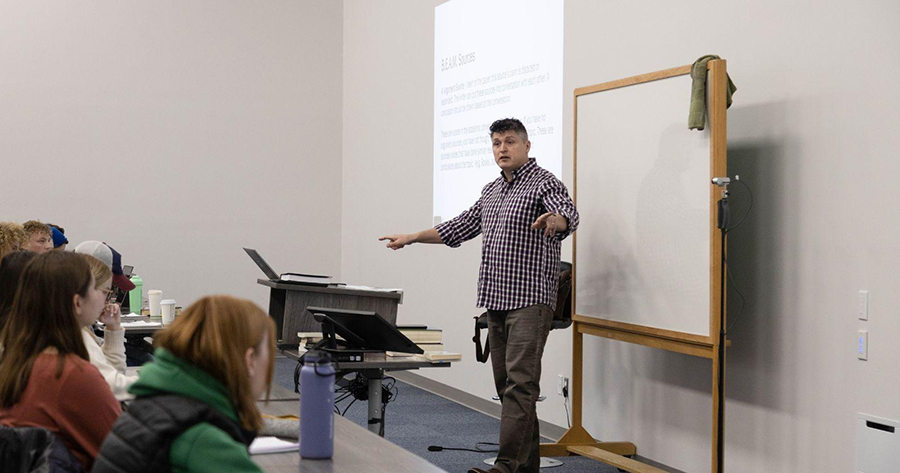Vocational Canada: Multivocational Ministers Project
Briercrest College and Seminary’s Pathway initiative, “Vocational Canada,” aims to build an accessible, affordable, inclusive, and sustainable community dedicated to preparing and supporting multivocational ministry leaders (MMLs). To achieve this goal, the project will identify current and potential MMLs and guide them through a self-assessment process. The insights gained will then inform the provision of educational resources, coaching, and mentoring. Additionally, the initiative plans to support MMLs and their families by offering counseling, spiritual direction, and, when necessary, financial assistance such as tuition underwriting, fee support, or charitable gifts. It will also collaborate with the New Leaf Network and the Wellness Project to research clergy health and enhance resource support for Canadian ministers.
Ellen Duffield, the project lead, discusses the progress of the initiative and offers insights on how others can benefit from their findings.
Briefly describe the project.
Vocational Canada was established to support three distinct groups of pastors who serve in dual or multiple vocational roles within their congregational leadership. We refer to these congregations as co-vocational. Taking this approach to co-vocations, our research suggests that one of the challenges that many co-vocational pastors experience is a sense of isolation because of their inability to connect with their denomination at regional gatherings and ministerial, in addition to the persistent stigma around being part-time.
We started with online sessions that, despite good attendance and positive feedback, didn’t build the community and cohorts we aimed for. So, we shifted to regional retreats – “Sacred Side Hustles” – held in partnership with local denominations at low cost. These gatherings form a core community where practitioners receive free counseling, leadership consulting, congregational support, online resources, and biweekly peer coaching (Convocational Masterminds).
 Support for congregations has been less utilized, likely due to outreach challenges and denominational silos. To bridge these gaps, we now work closely with denominations. For example, our seminary dean, Jason Mills, recently hosted a symposium for academic deans, denominational leaders, and practitioners. The event featured empirical research on growing convocational congregations by Wycliffe College, theological reflections, and interactive small group discussions that feed into our ongoing research.
Support for congregations has been less utilized, likely due to outreach challenges and denominational silos. To bridge these gaps, we now work closely with denominations. For example, our seminary dean, Jason Mills, recently hosted a symposium for academic deans, denominational leaders, and practitioners. The event featured empirical research on growing convocational congregations by Wycliffe College, theological reflections, and interactive small group discussions that feed into our ongoing research.
What have you learned so far?
We’ve learned three key things. First, the co-vocational community in Canada is more diverse than anticipated, with significant differences at personal, congregational, denominational, and regional levels, which impacts everything from theological education to training for second-career pastors and lay leaders. Second, we’ve observed polarization between denominations and pastors. Some engage deeply in theological reflection, while others adopt a “reactive” model, only shifting due to financial crises. Dr. Ross Bartlett refers to this as “crashing into bi-vocational.” Finally, mindset plays a crucial role. Research shows that pastors who choose bi-vocational roles tend to report better financial, personal, and ministry satisfaction. Conversely, those pushed into part-time roles against their preference experience higher burnout. Congregational mindset also matters; churches with a pastor-focused mindset struggle with co-vocational transitions, whereas those that emphasize the community’s role thrive.
What has surprised you along the way?
The key takeaways are:
1. Stigma Persists: Even though bi-vocational ministry has rich biblical and historical roots and is growing globally, there’s still strong stigma around it. Practitioners are asking for help in normalizing this model, drawing on theological foundations and success stories.
2. Learning from Immigrant Communities: Many newcomers to Canada have long adopted bi-vocational models, yet there’s little effort to learn from their experience. It’s a missed opportunity in understanding a model that’s been in practice for generations.
3. Beyond Size and Finances: Success in this model isn’t dependent on church size, location, or finances. It’s more about the congregation’s mission, community impact, and openness to shared leadership and ministry models.
4. Polarization in Church Sizes: There’s a growing divide between large and small churches in Canada – mid-size churches are particularly on the decline. Research suggests this shift reflects an increasing desire for deeper relational connections, especially since Covid, which has fueled the rise of small churches.
One major challenge is the persistent stigma against this model, even with its rich biblical and historical roots. Practitioners are asking us to help normalize its narrative by sharing theological foundations and real-life examples.
We’re also realizing that while many newcomers to Canada have long practiced vocational and bi-vocational ministry, we haven’t fully learned from their experience.
What are you learning that could help other schools?
Other schools can learn that a systems approach is essential. We discovered that simply supporting pastors isn’t enough – the broader ecosystem matters, including families, denominational ties, and community connections. This holistic strategy is replicable and crucial in today’s evolving church landscape in North America.
Briercrest College and Seminary has been preparing leaders for more than 80 years. Its ministry emerged from a community of believers who valued the Word of God and wanted to provide Bible training. That commitment remains at the heart of what Briercrest does and why they exist. Their aim is to call students to become fully devoted followers of Jesus Christ, and their approach to reaching this goal is increasingly unique in the educational landscape. Click here and here to learn more.